2014高考英语江西卷书面表达点评:常规型应用文
2014年高考英语短文写作分析共8页文档
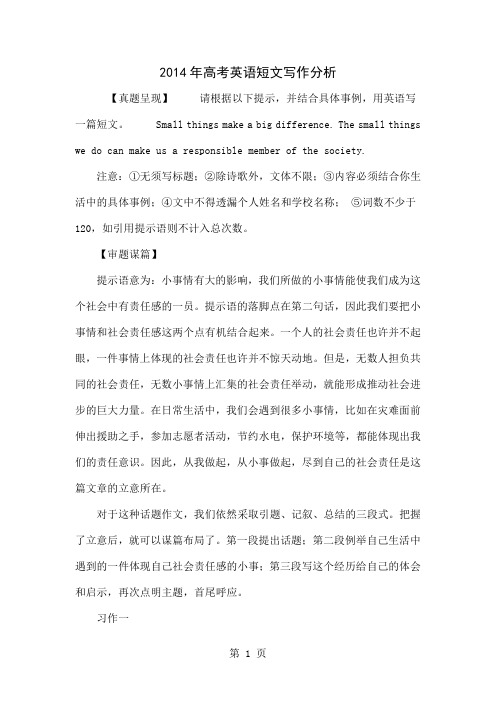
2014年高考英语短文写作分析【真题呈现】请根据以下提示,并结合具体事例,用英语写一篇短文。
Small things make a big difference. The small things we do can make us a responsible member of the society.注意:①无须写标题;②除诗歌外,文体不限;③内容必须结合你生活中的具体事例;④文中不得透漏个人姓名和学校名称;⑤词数不少于120,如引用提示语则不计入总次数。
【审题谋篇】提示语意为:小事情有大的影响,我们所做的小事情能使我们成为这个社会中有责任感的一员。
提示语的落脚点在第二句话,因此我们要把小事情和社会责任感这两个点有机结合起来。
一个人的社会责任也许并不起眼,一件事情上体现的社会责任也许并不惊天动地。
但是,无数人担负共同的社会责任,无数小事情上汇集的社会责任举动,就能形成推动社会进步的巨大力量。
在日常生活中,我们会遇到很多小事情,比如在灾难面前伸出援助之手,参加志愿者活动,节约水电,保护环境等,都能体现出我们的责任意识。
因此,从我做起,从小事做起,尽到自己的社会责任是这篇文章的立意所在。
对于这种话题作文,我们依然采取引题、记叙、总结的三段式。
把握了立意后,就可以谋篇布局了。
第一段提出话题;第二段例举自己生活中遇到的一件体现自己社会责任感的小事;第三段写这个经历给自己的体会和启示,再次点明主题,首尾呼应。
习作一As is known to us all, small things can make a big difference. In our daily life, even if the things we do are very small, we still can make us a responsible member of the society.For example, one weekend, our teachers took us to a park where we were about to plant trees. With the help of our teachers, everyone at least planted one tree. Some enthusiastic students planted more. Every one of us was really happy to do something for our society. In the meanwhile, we were confident that there would be a forest in the park many years later. Last week, I went to the park. Those trees we planted ten years ago have been taller than I. What a exciting thing! We do make us a responsible member of the society.Although we just did a small thing, but it did make a big difference. Don’t hesitate to do small thing just because they are small. Do it, and you will see the big change you make. Let us be a responsible member of the society.点评这是一篇中档习作。
江西2014高考英语作文

江西2014高考英语作文With the rapid development of technology, its influence on various aspects of life has become increasingly significant.In the context of Jiangxi's education system, the integration of technology in teaching and learning processes has brought about profound changes. This essay aims to explore the impact of technology on education in Jiangxi, particularly focusing on the benefits and challenges it presents to students and educators alike.Firstly, the advent of digital resources has greatly enriched the learning experience for students. Access to online libraries, educational websites, and e-books has expanded the horizons of students in Jiangxi, allowing them to explore a wide array of subjects beyond the traditional curriculum.This not only enhances their knowledge base but also fostersa culture of self-directed learning.Secondly, the use of interactive technology in classrooms has transformed the way teachers engage with students. Smartboards, educational apps, and online quizzes are now common tools that make learning more interactive and engaging. For instance, language classes can now incorporate multimedia content, such as videos and audio clips, to help students better understand and practice English pronunciation and listening skills.However, the integration of technology in education is notwithout its challenges. One of the primary concerns is the digital divide, which refers to the gap between those who have access to technology and those who do not. In some rural areas of Jiangxi, limited access to the internet and a lack of digital devices can hinder students' ability to benefit from technological advancements in education.Additionally, there is the issue of information overload. With the abundance of digital content available, students may find it difficult to discern credible sources from unreliable ones, which can lead to misinformation and a lack of focus on core subjects.To conclude, technology has undoubtedly brought aboutpositive changes to the education system in Jiangxi. It has the potential to enhance learning outcomes and prepare students for the digital age. However, it is crucial to address the challenges of the digital divide and information overload to ensure that all students, regardless of their background, can reap the benefits of technological advancements in education. Educators and policymakers must work together to create an inclusive and effective educational environment that leverages the power of technology while mitigating its potential pitfalls.。
2014年普通高中招生考试英语试题(江西卷)(解析版)
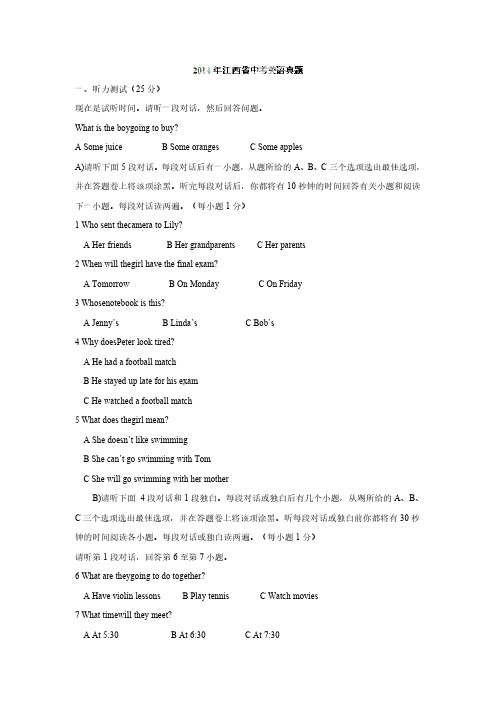
一、听力测试(25分)现在是试听时间。
请听一段对话,然后回答问题。
What is the boygoing to buy?A Some juiceB Some orangesC Some applesA)请听下面5段对话。
每段对话后有一小题,从题所给的A、B、C三个选项选出最佳选项,并在答题卷上将该项涂黑。
听完每段对话后,你都将有10秒钟的时间回答有关小题和阅读下一小题。
每段对话读两遍。
(每小题1分)1Who sent thecamera to Lily?A Her friendsB Her grandparentsC Her parents2When will thegirl have the final exam?A TomorrowB On MondayC On Friday3Whosenotebook is this?A Jenny’sB Linda’sC Bob’s4Why doesPeter look tired?A He had a football matchB He stayed up late for his examC He watched a football match5What does thegirl mean?A She doesn’t like swimmingB She can’t go swimming with TomC She will go swimming with her motherB)请听下面4段对话和1段独白。
每段对话或独白后有几个小题,从踢所给的A、B、C三个选项选出最佳选项,并在答题卷上将该项涂黑。
听每段对话或独白前你都将有30秒钟的时间阅读各小题。
每段对话或独白读两遍。
(每小题1分)请听第1段对话,回答第6至第7小题。
6What are theygoing to do together?A Have violin lessonsB Play tennisC Watch movies7What timewill they meet?A At5:30B At6:30C At7:30请听第2段对话,回答第8至第9小题。
2014江西南昌高考英语作文范文
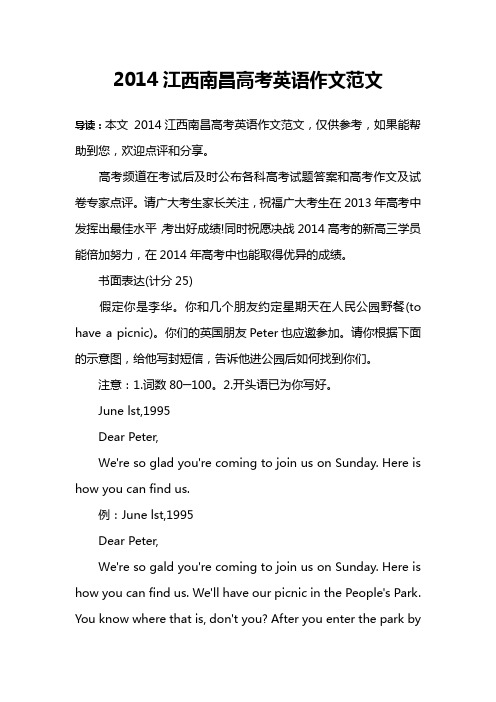
2014江西南昌高考英语作文范文导读:本文2014江西南昌高考英语作文范文,仅供参考,如果能帮助到您,欢迎点评和分享。
高考频道在考试后及时公布各科高考试题答案和高考作文及试卷专家点评。
请广大考生家长关注,祝福广大考生在2013年高考中发挥出最佳水平,考出好成绩!同时祝愿决战2014高考的新高三学员能倍加努力,在2014年高考中也能取得优异的成绩。
书面表达(计分25)假定你是李华。
你和几个朋友约定星期天在人民公园野餐(to have a picnic)。
你们的英国朋友Peter也应邀参加。
请你根据下面的示意图,给他写封短信,告诉他进公园后如何找到你们。
注意:1.词数80─100。
2.开头语已为你写好。
June lst,1995Dear Peter,We're so glad you're coming to join us on Sunday. Here is how you can find us.例:June lst,1995Dear Peter,We're so gald you're coming to join us on Sunday. Here is how you can find us. We'll have our picnic in the People's Park. You know where that is, don't you? After you enter the park bythe main gate, walk straight on till you come to a stream. Cross the stream and turn right. After walking for a while you'll come to a hill. Walk around to the other side of the hill. There you'll see a lake. We'll have our picnic there in the small woods by the lake. I'm sure you'll have no trouble finding us. Do come! Li Hua。
2014年高考真题英语试卷(江西卷)word版 有答案
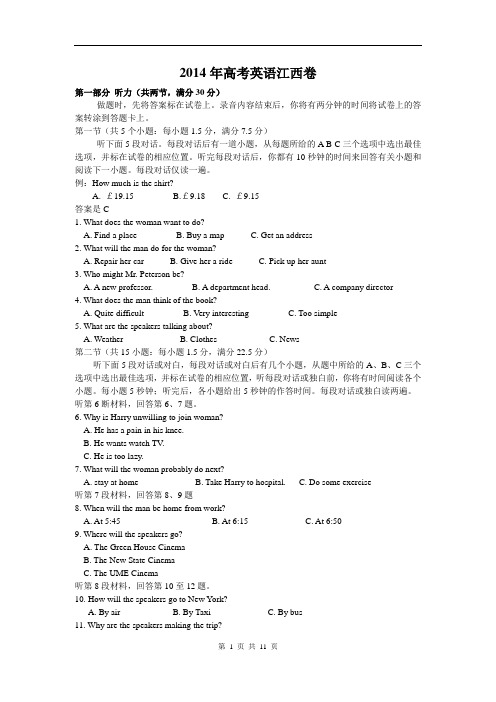
2014年高考英语江西卷第一部分听力(共两节,满分30分)做题时,先将答案标在试卷上。
录音内容结束后,你将有两分钟的时间将试卷上的答案转涂到答题卡上。
第一节(共5个小题:每小题1.5分,满分7.5分)听下面5段对话。
每段对话后有一道小题,从每题所给的A B C三个选项中选出最佳选项,并标在试卷的相应位置。
听完每段对话后,你都有10秒钟的时间来回答有关小题和阅读下一小题。
每段对话仅读一遍。
例:How much is the shirt?A. £19.15B.£9.18C. £9.15答案是C1. What does the woman want to do?A. Find a placeB. Buy a mapC. Get an address2. What will the man do for the woman?A. Repair her carB. Give her a rideC. Pick up her aunt3. Who might Mr. Peterson be?A. A new professor.B. A department head.C. A company director4. What does the man think of the book?A. Quite difficultB. V ery interestingC. Too simple5. What are the speakers talking about?A. WeatherB. ClothesC. News第二节(共15小题:每小题1.5分,满分22.5分)听下面5段对话或对白,每段对话或对白后有几个小题,从题中所给的A、B、C三个选项中选出最佳选项,并标在试卷的相应位置,听每段对话或独白前,你将有时间阅读各个小题。
每小题5秒钟;听完后,各小题给出5秒钟的作答时间。
每段对话或独白读两遍。
听第6断材料,回答第6、7题。
2014年高考英语江西卷及答案
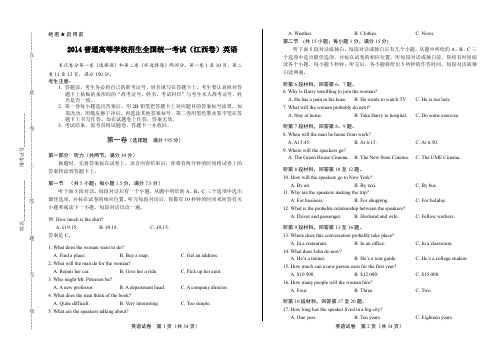
英语试卷 第1页(共36页)英语试卷 第2页(共36页)绝密★启用前2014普通高等学校招生全国统一考试(江西卷)英语本试卷分第一卷(选择题)和第二卷(非选择题)两部分。
第一卷1至10页,第二卷11至12页,满分150分。
考生注意:1. 答题前,考生务必将自己的准考证号、姓名填写在答题卡上。
考生要认真核对答题卡上粘贴的条形码的“准考证号、姓名、考试科目”与考生本人准考证号、姓名是否一致。
2. 第一卷每小题选出答案后,用2B 铅笔把答题卡上对应题目的答案标号涂黑,如需改动,用橡皮擦干净后,再选涂其他答案标号。
第二卷用黑色墨水签字笔在答题卡上书写作答。
如在试题卷上作答,答案无效。
3. 考试结束,监考员将试题卷、答题卡一并收回。
第一卷(选择题 满分115分)第一部分 听力(共两节,满分30分)做题时,先将答案标在试卷上。
录音内容结束后,你将有两分钟的时间将试卷上的答案转涂到答题卡上。
第一节 (共5小题;每小题1.5分,满分7.5分)听下面5段对话。
每段对话后有一个小题,从题中所给的A 、B 、C 三个选项中选出最佳选项,并标在试卷的相应位置。
听完每段对话后,你都有10秒钟的时间来回答有关小题和阅读下一小题。
每段对话仅读一遍。
例: How much is the shirt? A. £19.15.B. £9.18.C. £9.15.答案是C 。
1. What does the woman want to do? A. Find a place. B. Buy a map.C. Get an address. 2. What will the man do for the woman?A. Repair her car.B. Give her a ride.C. Pick up her aunt. 3. Who might Mr. Peterson be? A. A new professor. B. A department head. C. A company director. 4. What does the man think of the book? A. Quite difficult.B. Very interesting.C. Too simple.5. What are the speakers talking about?A. Weather.B. Clothes.C. News.第二节 (共15小题;每小题1分,满分15分)听下面5段对话或独白。
2014年高考英语江西卷有答案
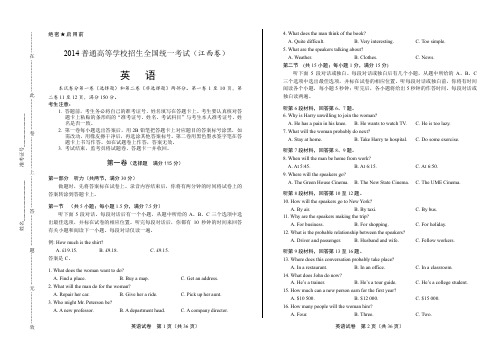
英语试卷 第1页(共36页)英语试卷 第2页(共36页)绝密★启用前2014普通高等学校招生全国统一考试(江西卷)英语本试卷分第一卷(选择题)和第二卷(非选择题)两部分。
第一卷1至10页,第二卷11至12页,满分150分。
考生注意:1. 答题前,考生务必将自己的准考证号、姓名填写在答题卡上。
考生要认真核对答题卡上粘贴的条形码的“准考证号、姓名、考试科目”与考生本人准考证号、姓名是否一致。
2. 第一卷每小题选出答案后,用2B 铅笔把答题卡上对应题目的答案标号涂黑,如需改动,用橡皮擦干净后,再选涂其他答案标号。
第二卷用黑色墨水签字笔在答题卡上书写作答。
如在试题卷上作答,答案无效。
3. 考试结束,监考员将试题卷、答题卡一并收回。
第一卷(选择题 满分115分)第一部分 听力(共两节,满分30分)做题时,先将答案标在试卷上。
录音内容结束后,你将有两分钟的时间将试卷上的答案转涂到答题卡上。
第一节 (共5小题;每小题1.5分,满分7.5分)听下面5段对话。
每段对话后有一个小题,从题中所给的A 、B 、C 三个选项中选出最佳选项,并标在试卷的相应位置。
听完每段对话后,你都有10秒钟的时间来回答有关小题和阅读下一小题。
每段对话仅读一遍。
例: How much is the shirt? A. £19.15.B. £9.18.C. £9.15.答案是C 。
1. What does the woman want to do? A. Find a place. B. Buy a map.C. Get an address. 2. What will the man do for the woman?A. Repair her car.B. Give her a ride.C. Pick up her aunt. 3. Who might Mr. Peterson be? A. A new professor.B. A department head.C. A company director.4. What does the man think of the book? A. Quite difficult.B. Very interesting.C. Too simple. 5. What are the speakers talking about? A. Weather.B. Clothes.C. News.第二节 (共15小题;每小题1分,满分15分)听下面5段对话或独白。
2014年高考英语江西卷-答案
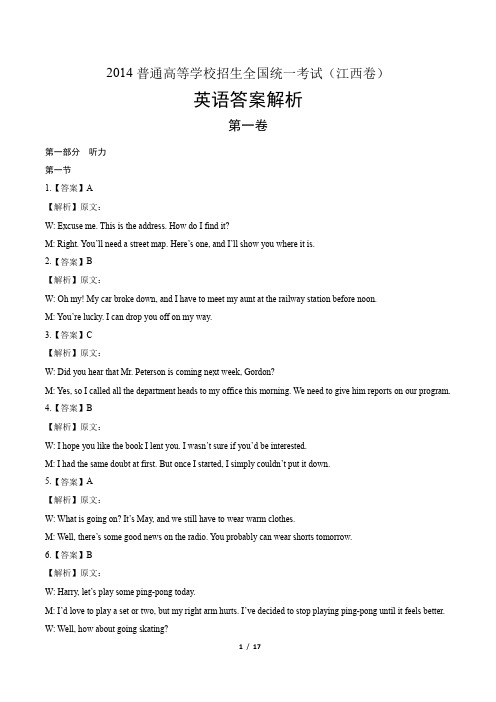
2014普通高等学校招生全国统一考试(江西卷)英语答案解析第一卷第一部分听力第一节1.【答案】A【解析】原文:W: Excuse me. This is the address. How do I find it?M: Right. You’ll need a street map. Here’s one, and I’ll show you where it is.2.【答案】B【解析】原文:W: Oh my! My car broke down, and I have to meet my aunt at the railway station before noon.M: You’re lucky. I can drop you off on my way.3.【答案】C【解析】原文:W: Did you hear that Mr. Peterson is coming next week, Gordon?M: Yes, so I called all the department heads to my office this morning. We need to give him reports on our program.4.【答案】B【解析】原文:W: I hope you like the book I lent you. I wasn’t sure if you’d be interested.M: I had the same doubt at first. But once I started, I simply couldn’t put it down.5.【答案】A【解析】原文:W: What is going on? It’s May, and we still have to wear warm clothes.M: Well, there’s some good news on the radio. You probably can wear shorts tomorrow.6.【答案】B【解析】原文:W: Harry, let’s play some ping-pong today.M: I’d love to play a set or two, but my right arm hurts. I’ve decided to stop playing ping-pong until it feels better. W: Well, how about going skating?M: I’d like to, but my knee hurts, too.W: Harry, stop making excuses! You’re just lazy.M: No, I’m not! You know, there’s a basketball match on TV today. Let’s just stay home and watch it.W: OK. You stay, and I’ll play with Helen.7.【答案】C【解析】原文:W: Harry, let’s play some ping-pong today.M: I’d love to play a set or two, but my right arm hurts. I’ve decided to stop playing ping-pong until it feels better. W: Well, how about going skating?M: I’d like to, but my knee hurts, too.W: Harry, stop making excuses! You’re just lazy.M: No, I’m not! You know, there’s a basketball match on TV today. Let’s just stay home and watch it.W: OK. You stay, and I’ll play with Helen.8.【答案】A【解析】原文:W: What do you want to do tonight?M: How about going to the cinema? I should be home from work at 5:45. Then we can go out and eat before we see a film.W: What do you want to see?M: There’s a good art film at the Green House Cinema.W: Let’s see…it starts at 6:15. I don’t think we can get there in time to see the beginning. How about the action film at the New State Cinema? It starts at 6:50. Perhaps the 7:00 one at the UME Cinema is even better. It stars Jackie Chan.M: OK, that’s fine. I like him, too.9.【答案】C【解析】原文:W: What do you want to do tonight?M: How about going to the cinema? I should be home from work at 5:45. Then we can go out and eat before we see a film.W: What do you want to see?M: There’s a good art film at the Green House Cinema.W: Let’s see…it starts at 6:15. I don’t think we can get there in time to see the beginning. How about the action film at the New State Cinema? It starts at 6:50. Perhaps the 7:00 one at the UME Cinema is even better. It stars Jackie Chan.M: OK, that’s fine. I like him, too.10.【答案】A【解析】原文:M: Hey, Lucy. Do you have some time to talk about next week’s trip with me?W: Sure, Dave.M: OK. So, we’re leaving on Monday from Hartsfield International Airport, and returning on Friday. Do we take ourselves to the airport? Maybe we need to book a taxi, or just go by bus.W: No, we don’t have to. The company car will pick us up and take us there.M: Oh, that’s good. When?W: Our flight leaves at 11:00 a.m., so they should pick us up between 8:00 and 9:00 a.m. Besides, the company pays for our trip, including hotel and food.M: How much will that be?W: Well, New York is a pretty expensive city. So, each of us will get $200 a day.M: Oh, OK. Thanks for telling me that.W: You’re welcome.11.【答案】A【解析】原文:M: Hey, Lucy. Do you have some time to talk about next week’s trip with me?W: Sure, Dave.M: OK. So, we’re leaving on Monday from Hartsfield International Airport, and returning on Friday. Do we take ourselves to the airport? Maybe we need to book a taxi, or just go by bus.W: No, we don’t have to. The company car will pick us up and take us there.M: Oh, that’s good. When?W: Our flight leaves at 11:00 a.m., so they should pick us up between 8:00 and 9:00 a.m. Besides, the company pays for our trip, including hotel and food.M: How much will that be?W: Well, New York is a pretty expensive city. So, each of us will get $200 a day.M: Oh, OK. Thanks for telling me that.W: You’re welcome.12.【答案】C【解析】原文:M: Hey, Lucy. Do you have some time to talk about next week’s trip with me?W: Sure, Dave.M: OK. So, we’re leaving on Monday from Hartsfield International Airport, and returning on Friday. Do we take ourselves to the airport? Maybe we need to book a taxi, or just go by bus.W: No, we don’t have to. The company car will pick us up and take us there.M: Oh, that’s good. When?W: Our flight leaves at 11:00 a.m., so they should pick us up between 8:00 and 9:00 a.m. Besides, the company pays for our trip, including hotel and food.M: How much will that be?W: Well, New York is a pretty expensive city. So, each of us will get $200 a day.M: Oh, OK. Thanks for telling me that.W: You’re welcome.13.【答案】B【解析】原文:W: Please sit down. Let’s see…you’re Mr. Smith. Is that correct?M: Yes. John Smith.W: And you’re interested in this job?M: Yes, I am. I’ll graduate from college the coming June. My major is Chinese.W: I see. Have you ever done any work in this field?M: Yes, I used to be a tour guide for Chinese travelers.W: Good. Now, how much money do you expect to have for a year?M: From what I’ve read, it seems that a starting pay would be around $12,000 a year.W: Here, you would start at $10,500 for the first year…a kind of training period. Then you would go to $15,000. M: That sounds fair enough. What do you think are the chances for me to get a job here?W: Well, I’m talking to three people today and four tomorrow. We’ll be hiring two people. You’ll hear from us sometime next month. Good luck! And thanks for coming in today.14.【答案】C【解析】原文:W: Please sit down. Let’s see…you’re Mr. Smith. Is that correct?M: Yes. John Smith.W: And you’re interested in this job?M: Yes, I am. I’ll graduate from college the coming June. My major is Chinese.W: I see. Have you ever done any work in this field?M: Yes, I used to be a tour guide for Chinese travellers.W: Good. Now, how much money do you expect to have for a year?M: From what I’ve read, it seems that a starting pay would be around $12,000 a year.W: Here, you would start at $10,500 for the first year…a kind of training period. Then you would go to $15,000. M: That sounds fair enough. What do you think are the chances for me to get a job here?W: Well, I’m talking to three people today and four tomorrow. We’ll be hiring two people. You’ll hear from us sometime next month. Good luck! And thanks for coming in today.15.【答案】A【解析】原文:W: Please sit down. Let’s see…you’re Mr. Smith. Is that correct?M: Yes. John Smith.W: And you’re interested in this job?M: Yes, I am. I’ll graduate from college the coming June. My major is Chinese.W: I see. Have you ever done any work in this field?M: Yes, I used to be a tour guide for Chinese travelers.W: Good. Now, how much money do you expect to have for a year?M: From what I’ve read, it seems that a starting pay would be around $12,000 a year.W: Here, you would start at $10,500 for the first year…a kind of training period. Then you would go to $15,000. M: That sounds fair enough. What do you think are the chances for me to get a job here?W: Well, I’m talking to three people today and four tomorrow. We’ll be hiring two people. You’ll hear from us sometime next month. Good luck! And thanks for coming in today.16.【答案】C【解析】原文:W: Please sit down. Let’s see…you’re Mr. Smith. Is that correct?M: Yes. John Smith.W: And you’re interested in this job?M: Yes, I am. I’ll graduate from college the coming June. My major is Chinese.W: I see. Have you ever done any work in this field?M: Yes, I used to be a tour guide for Chinese travelers.W: Good. Now, how much money do you expect to have for a year?M: From what I’ve read, it seems that a starting pay would be around $12,000 a year.W: Here, you would start at $10,500 for the first year…a kind of training period. Then you would go to $15,000. M: That sounds fair enough. What do you think are the chances for me to get a job here?W: Well, I’m talking to three people today and four tomorrow. We’ll be hiring two people. You’ll hear from us sometime next month. Good luck! And thanks for coming in today.17.【答案】B【解析】原文:M: Well, I’d love to share with you my personal opinions on city life and life in small towns. I grew up in a small town until I was 18 and then moved to a big city, so I have experienced the good and bad sides of both. I never thought that I would like living in a big city, but I was wrong. After ten years of living in one, I can’t imagine ever living in a small town again. Surely small towns and big cities both have some problems in terms of transport. In a small town, you have to own a car to make life comfortable. You can’t get around without one because there isn’t any kind of public transport. Big cities generally have heavy traffic and expensive parking, but there you have a choice of taking public transport, which is cheaper than driving. So, if you don’t have a car, you’d better live in the city. I also love the exciting life in big cities. I can always enjoy a lot of films, concerts, and other wonderful shows. However, these things are not common in small towns. The final thing I like about large cities is that you can meet different kinds of people. However, you seldom find such a variety of people in a smaller town. I think that living in an area where everyone was just like me would quickly become dull. Of course, safety should be considered, and that’s one area where small towns are better than big cities. Still, I would rather be a bit more careful and live in a large city than to feel safe but dull.18.【答案】C【解析】原文:M: Well, I’d love to share with you my personal opinions on city life and life in small towns. I grew up in a small town until I was 18 and then moved to a big city, so I have experienced the good and bad sides of both. I never thought that I would like living in a big city, but I was wrong. After ten years of living in one, I can’t imagine ever living in a small town again. Surely small towns and big cities both have some problems in terms of transport. In a small town, you have to own a car to make life comfortable. You can’t get around without one because there isn’tany kind of public transport. Big cities generally have heavy traffic and expensive parking, but there you have a choice of taking public transport, which is cheaper than driving. So, if you don’t have a car, you’d better live in the city. I also love the exciting life in big cities. I can always enjoy a lot of films, concerts, and other wonderful shows. However, these things are not common in small towns. The final thing I like about large cities is that you can meet different kinds of people. However, you seldom find such a variety of people in a smaller town. I think that living in an area where everyone was just like me would quickly become dull. Of course, safety should be considered, and that’s one area where small towns are better than big cities. Still, I would rather be a bit more careful and live in a large city than to feel safe but dull.19.【答案】A【解析】原文:M: Well, I’d love to share with you my personal opinions on city life and life in small towns. I grew up in a small town until I was 18 and then moved to a big city, so I have experienced the good and bad sides of both. I never thought that I would like living in a big city, but I was wrong. After ten years of living in one, I can’t imagine ever living in a small town again. Surely small towns and big cities both have some problems in terms of transport. In a small town, you have to own a car to make life comfortable. You can’t get around without one because there isn’t any kind of public transport. Big cities generally have heavy traffic and expensive parking, but there you have a choice of taking public transport, which is cheaper than driving. So, if you don’t have a car, you’d better live in the city. I also love the exciting life in big cities. I can always enjoy a lot of films, concerts, and other wonderful shows. However, these things are not common in small towns. The final thing I like about large cities is that you can meet different kinds of people. However, you seldom find such a variety of people in a smaller town. I think that living in an area where everyone was just like me would quickly become dull. Of course, safety should be considered, and that’s one area where small towns are better than big cities. Still, I would rather be a bit more careful and live in a large city than to feel safe but dull.20.【答案】B【解析】原文:M: Well, I’d love to share with you my personal opinions on city life and life in small towns. I grew up in a small town until I was 18 and then moved to a big city, so I have experienced the good and bad sides of both. I never thought that I would like living in a big city, but I was wrong. After ten years of living in one, I can’t imagine ever living in a small town again. Surely small towns and big cities both have some problems in terms of transport. In a small town, you have to own a car to make life comfortable. You can’t get around without one because there isn’t any kind of public transport. Big cities generally have heavy traffic and expensive parking, but there you have achoice of taking public transport, which is cheaper than driving. So, if you don’t have a car, you’d better live in the city. I also love the exciting life in big cities. I can always enjoy a lot of films, concerts, and other wonderful shows. However, these things are not common in small towns. The final thing I like about large cities is that you can meet different kinds of people. However, you seldom find such a variety of people in a smaller town. I think that living in an area where everyone was just like me would quickly become dull. Of course, safety should be considered, and that’s one area where small towns are better than big cities. Still, I would rather be a bit more careful and live in a large city than to feel safe but dull.第二部分英语知识运用第一节单项填空21. 【答案】B【解析】本题的是交际用语。
- 1、下载文档前请自行甄别文档内容的完整性,平台不提供额外的编辑、内容补充、找答案等附加服务。
- 2、"仅部分预览"的文档,不可在线预览部分如存在完整性等问题,可反馈申请退款(可完整预览的文档不适用该条件!)。
- 3、如文档侵犯您的权益,请联系客服反馈,我们会尽快为您处理(人工客服工作时间:9:00-18:30)。
2014高考英语江西卷书面表达点评:常规型应用文
新东方在线
举国瞩目的2014高考已结束,新东方在线高考名师团队第一时间对2014高考英语真题进行了点评,希望能对考生、家长有所帮助,也希望对2015高考考生提供借鉴。
以下是新东方在线李辉老师、王欣老师对江西卷书面表达真题的解析和点评。
看到江西卷今年的书面表达题目,许多考生莞尔一笑:李华准时现身,再次带来感动。
题目要求考生写一篇在英语沙龙活动上的发言稿,发言内容已经以要点提纲的形式给出。
这是一篇典型的应用文。
天津卷2009年、山东卷2012年的书面表达中都曾考查过发言稿的写法,出题的风格和特点与之非常类似。
因此,这类作文属于常规型的、大部分考生较熟悉的作文。
然而,即使大家对该题型都熟悉,在考场上拿到高分,还需要掌握遣词造句和作文升级技巧。
在落笔之前,对作文的段落布局要进行整体构思。
由于开头和结尾已经给出,考生需要着重构思的其实就是写作提纲中给出的要点。
根据要点,可以划分为三大段来写,每段都写成最安全的“T-E”结构,即“主题句—解释句—总结句”结构。
每段的主题句就是每个序号后的四个字,分别为“学会学习”“学会做人”“学会其他”,第三个要点考生可以自由发挥。
这里需要注意的是,英语表达不等于逐字翻译。
大家在写主题句时,要学会转换思维,避免频繁地使用同一表达。
在规划好段落布局后,考生要思考的是每段具体该如何写,写什么,这时可以采用“亮点提纲法”,把要表达的观点以亮点短语和句型的方式一一在草稿纸上列出,再组织成文即可。
对于一些基础薄弱的同学,如果因为一时紧张而想不出亮点也不要担心,先用自己最有把握的、最基本、最简单的英语来清楚地表达观点,再灵活使用我们讲过的“前面添一添,后面补一补”的技巧,同样可以提升文章档次。
简言之,江西卷书面表达的题型和难度没有发生很大变化,依然采用了我们熟悉的“李华写信”模式。
如果大家掌握了我们再《高考英语15天快速提分班》上讲过的书面表达基本的遣词造句技巧和作文升级技巧,经过了应用文各种题材的模拟训练,备考这类作文易如反掌。
更多相关高考考试指导,请登陆新东方在线官方网站:。
